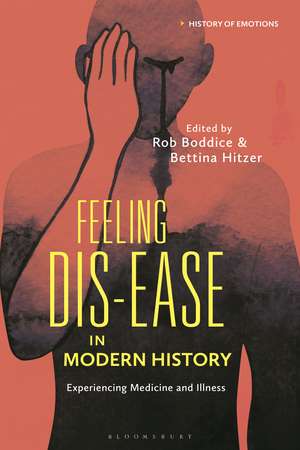Feeling Dis-ease in Modern History: Experiencing Medicine and Illness: History of Emotions
Editat de Rob Boddice, Bettina Hitzeren Limba Engleză Paperback – 27 dec 2023
| Toate formatele și edițiile | Preț | Express |
|---|---|---|
| Paperback (1) | 192.90 lei 6-8 săpt. | +46.02 lei 7-13 zile |
| Bloomsbury Publishing – 27 dec 2023 | 192.90 lei 6-8 săpt. | +46.02 lei 7-13 zile |
| Hardback (1) | 540.96 lei 6-8 săpt. | +116.47 lei 7-13 zile |
| Bloomsbury Publishing – iun 2022 | 540.96 lei 6-8 săpt. | +116.47 lei 7-13 zile |
Preț: 192.90 lei
Preț vechi: 222.88 lei
-13% Nou
Puncte Express: 289
Preț estimativ în valută:
36.91€ • 38.54$ • 30.55£
36.91€ • 38.54$ • 30.55£
Carte tipărită la comandă
Livrare economică 05-19 aprilie
Livrare express 01-07 martie pentru 56.01 lei
Preluare comenzi: 021 569.72.76
Specificații
ISBN-13: 9781350228405
ISBN-10: 1350228400
Pagini: 296
Ilustrații: 8 bw illus
Dimensiuni: 156 x 234 x 25 mm
Greutate: 0.42 kg
Editura: Bloomsbury Publishing
Colecția Bloomsbury Academic
Seria History of Emotions
Locul publicării:London, United Kingdom
ISBN-10: 1350228400
Pagini: 296
Ilustrații: 8 bw illus
Dimensiuni: 156 x 234 x 25 mm
Greutate: 0.42 kg
Editura: Bloomsbury Publishing
Colecția Bloomsbury Academic
Seria History of Emotions
Locul publicării:London, United Kingdom
Caracteristici
Brings together a range of themes, disciplinary approaches and time periods to examine the affective dimensions of health and ill-health
Notă biografică
Rob Boddice is Senior Research Fellow at the Academy of Finland Centre of Excellence in the History of Experiences, Tampere University, Finland, and Adjunct Professor at the Department of Social Studies of Medicine, McGill University, Canada. He is the author or editor of eleven books, most recently Humane Professions (2021), Emotion, Sense, Experience, with Mark Smith (2020), A History of Feelings (2019), and The History of Emotions (2018). Bettina Hitzer is Heisenberg Fellow at the Hannah Arendt Institute for Totalitarianism Studies at the Technical University Dresden as well as Privatdozentin at Freie Universität Berlin, Germany. From 2014-2020, she was Leader of the Minerva Research Group "Emotions and Illness: Histories of an Intricate Relation" at the Max Planck Institute for Human Development, Berlin. She was awarded the 2020 Leipzig Book Fair Prize for her most recent book, Krebs fühlen (2020). She is the author or (co-)editor of nine books and four special issues including "History of Science and the Emotions" (Osiris, 2016).
Cuprins
IllustrationsContributorsAcknowledgements IntroductionEmotion and Experience in the History of Medicine: Elaborating A Theory and Seeking A Method, Rob Boddice and Bettina Hitzer Lived Epidemic Commentary 1. Feeling the Dis-Ease of Ebola: An Invisible War, Emmanuel King Urey-Yarkpawolo 2. Ebola Wahala: Breaching Experiments in a Sierra Leonean Border Town, Luisa Enria and Angus Fayia Tengbeh 3. History before Corona: Memory, Experience, and Emotions, Bettina Hitzer Datafication and Knowledge Production Commentary 4. The Binary Logic of Emotion in the Sensorium of Virtual Health: The Case of Happify, Kirsten Ostherr 5. Third Person: Narrating Dis-Ease and Knowledge in Psychiatric Case Histories, Marietta Meier Dis-ease Narratives: Making and Listening Commentary 6. Feeling (and Falling) Ill: Finding a Language of Illness, Franziska Gygax 7. Beyond Symptomology: Listening to How Palestinians Conceive of their own Suffering and Well-being, Heidi Morrison Expertise, Authority, Emotion Commentary 8. Forensic Sense: Sexual Violence, Medical Professionals, and the Senses, Joanna Bourke 9. The Concept of Leidensdruck in West-German Criminal Therapy, 1960-85, Marcel Streng Construction and Contingency of Experience Commentary 10. The Efficacy of Arcadia: Constructing Emotions of Nature in the Pained Body through Landscape Imagery, c.1945-Present, Brenda Lynn Edgar 11. 'Fashionable' Diseases in Georgian Britain: Medical Theory, Cultural Meanings and Lived Experience, James Kennaway Material, Objects, Feelings Commentary 12. From a Patient's Point of View: A Sensual-Perceptual Approach to Bed Treatment, Monika Ankele 13. Feeling Penfield, Annmarie Adams Select BibliographyIndex
Recenzii
[This] book would be of value to diverse scholars across disciplinary boundaries. ... The history of emotions has achieved a kind of theoretical and methodological sophistication and maturity that allow us to explore how emotions change and why. Feeling Dis-ease is the evidence.
Many disciplines are represented across the volume, such that interested readers will likely be found in history and psychology departments, as well as in schools of medicine ... Recommended. Upper-division undergraduates. Graduate students and faculty.
This is an innovative and ambitious volume that brings together a range of themes, disciplinary approaches, time-periods, and places to examine the affective dimensions of health and ill-health. This book is about being both well and sick, and considers the experiences of practitioners, patients, and the public.
If there is a handbook on how to write the affective into the history of medicine and health, this is it. Writing during a pandemic, the authors are attuned to the uproars and silences that comprise the emotionally-charged responses to personal and collective suffering from a rich array of perspectives.
Many disciplines are represented across the volume, such that interested readers will likely be found in history and psychology departments, as well as in schools of medicine ... Recommended. Upper-division undergraduates. Graduate students and faculty.
This is an innovative and ambitious volume that brings together a range of themes, disciplinary approaches, time-periods, and places to examine the affective dimensions of health and ill-health. This book is about being both well and sick, and considers the experiences of practitioners, patients, and the public.
If there is a handbook on how to write the affective into the history of medicine and health, this is it. Writing during a pandemic, the authors are attuned to the uproars and silences that comprise the emotionally-charged responses to personal and collective suffering from a rich array of perspectives.











